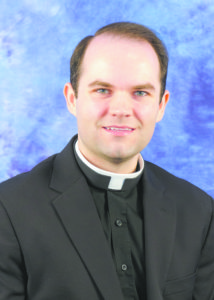
Deacon Aaron Williams
Spirit and Truth
By Deacon Aaron M. Williams
During this past Holy Week, I read a homily a friend of mine delivered on Holy Thursday. He raised an important point about the identity of the Mass which I had not given much consideration until now. He said that in the Mass, “We are in no way re-enacting the Last Supper…the Mass is not the Last Supper.” The reason I find this statement so striking isn’t because I disagree with him — I couldn’t agree more that he is right! But, far more important than that is that most Catholics, and indeed some people who teach others about the Mass, get this point wrong or falsely assume that simply because our Lord instituted the Eucharist at the Last Supper that the Mass itself is a reenactment of that same supper.
The fact of the matter is that when Christ gave us this Sacrament, he gave it as a sign of his own passion, death and resurrection — what the Second Vatican Council termed the “Paschal mystery.” The Passover meal of the Jews recalled the meal that the enslaved Hebrews ate before they were led in Exodus out of Egypt. To eat the Passover (Seder) meal, was to recall the moment before God rescued them. But, not the Eucharist. Christ the Lord took this Passover meal and made it not a sign of another meal before a saving act, but a sign of the act itself — “This is my Body, which will be given for you.” Thus, the Catechism of the Catholic Church very rightly proclaims, “In the liturgy of the Church, it is principally his own Paschal mystery that Christ signifies and makes present” (1085).
This is one area where Catholic theology strongly diverges from our Protestant brothers and sisters. For the Protestant, to eat the “Lord’s Supper” is like a Seder meal — a symbolic meal that we use to remember Jesus’s ‘last meal’ on Earth. But, when the Catholic gazes upon the sacred host held aloft by the priest, we look not upon a simple meal, but upon Christ crucified and sacrificed for us all. The Cathechism says, “The Eucharist is thus a sacrifice because it re-presents (makes present) the sacrifice of the cross…the sacrifice of Christ and the sacrifice of the Eucharist are one single sacrifice” (1366-7).
The celebration of the liturgies of the Triduum each year gives us time to reflect particularly on the individual aspects of the Paschal mystery, but in each Mass we experience these events in a single expression. In every Mass, we receive the benefits of our Lord’s passion, death and resurrection.
This revelation should enable us to undergo a different sort of preparation for the Mass. We are not coming together each week for a simple family meal — although this idea has been promoted in recent times. The concept of the Mass as a sit-down meal between God the Father and the human family, while quaint and charming, hardly does justice to the reality of Christ’s sacrifice. Is the Eucharist a meal? Yes, of course. But, it is a meal that comes as the fruit of sacrifice — just as in the old covenant, the Hebrew people would eat the flesh of sacrificed animals in order to reap the effects of the sacrifice. In the Mass, the Lord himself feeds us his own sacrificed flesh so that we can benefit from the effects of that same sacrifice.
The altar in every church is therefore both the altar of sacrifice and the table of the Lord — the two aspects go hand-in-hand. This is the reason that the architectural legislation of the Church requires the altar to be made from a solid material and to be dignified. It is not meant to be a mere family dinner table, but a true altar. In fact, it is strongly recommended that the altar of each church be completely immovable as the focus and center of that church. Likewise, we do not adorn our altars in the same way we would prepare a thanksgiving meal at home — with tablecloths and cornucopias of produce. The Catholic altar is wrapped in white linen (signifying the burial shroud of Christ), and the only objects which are set upon it are those things needed for the sacrifice, namely the elements of bread and wine along with other things such as the missal and candles.
Finally, because the Mass is a true sacrifice, it is demanded of us that we bring something to it to be offered to God. I am not speaking of a physical object or a monetary donation, but of the spiritual sacrifice of our own good works, sufferings and sins. All of those things, we can place in the hands of the priest who, obedient to God’s command to “do this in memory of me,” offers it all with and for us to the Father.
(Deacon Aaron Williams and his classmate, Deacon Nicholas Adam, will be ordained to the priesthood May 31 at the Cathedral of St. Peter the Apostle.)
